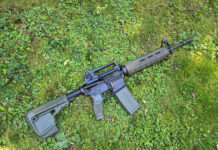[HTML1]
I’m thinking that the greatest advantage to Smithoptics’ lens serialization is that the company can use manufacturing info to defend themselves from a lawsuit by my executors after my killer’s bullet penetrates my eyeball right through their circum aural optical protectors. As our Armed Intelligentsia point out below, serialization’s real value: the company can evaluate post-incident protection, trace down any faults or problems and issue a specific recall if needed. And identify areas that may need improvement. Looks like old-fashioned QC’s days are numbered. So to speak.




Special is the new tactical.
Sounds like a cheap and easy way to make customers feel a bit more confident in their purchase. Whatever the problem is, I’m willing to bet its easier, and cheaper, for them to just send you a replacement and forget about it. Oh serialization oh my.
* eye roll *
I use Revisions and I love em.
I like Smiths too, but I’m only loyal to whatever I can find on SteepandCheap.
They don’t need to bother. Smiths already carry my seal of approval.
http://www.google.com/url?sa=t&source=web&cd=2&ved=0CCgQtwIwAQ&url=http%3A%2F%2Fwww.youtube.com%2Fwatch%3Fv%3D4X2AvfSTi6Q&ei=VzxhT_ONLoiY0QH-h8W2Bw&usg=AFQjCNE_3i8XbNraT2xiP47j6JFItKWzSA
This is about quality control. The point is if a random unknown pair of glasses is found to have a defect, they can then trace that back to the lot, or batch, that particular pair was a part of. Production is broken up into lots for this reason. Perhaps there was a defect with the plastic that round, they found out, then they can do a recall on every pair in that lot before the defect has any more impact. This is the same quality and safety procedure taken in several industries.
+1, Every pair of eyepro the Army uses now is serial numbered, and after an incident (IED, etc.) it is sent back to the manufacturer for evaluation.
What’s wrong with seiamization? It also helps identify it if it is stolen and recovered.
This is a common practice in most areas of manufacturing.
Even serialization of weapons is t really a problem unless the government has the list of weapons and owners.
Sialization doesn’t oppress people. Tyrannical governments oppress people.
At least for my part, and I think some others feel this way as well, it’s not that it’s oppressive or intrusive, just unnecessary and gimmicky. I can see the value in it for customers like the military, but for general end users, it’s just…
For all we know since they are serial numbered for the .mil, it might be of negligible cost to serial number all production as a uniform process rather than creating separate production lines.
Yeah, I suppose that’s true, and if bragging on it gains them a few extra sales in the civilian market, it’s win-win.
This.
Making their products aimed at ordinary citizens on the same production lines as their military-contract products is smart business for a NUMBER of reasons. First and foremost, it means that they only have to worry logistically about making ONE product instead of TWO; this saves money, and means that if they over-run their contract, they can just put them in the normal-people packaging. Second, it means that they can bill their normal-people products as being ‘mil-spec,’ because they truly are.
In short, they already have the hardware to do it, and it makes sense from both marketing and QC standpoints, so the real question is why they SHOULDN’T do it.
Wow. My iPhone really messed up my spellings. Sorry I didn’t catch the errors.
Comments are closed.